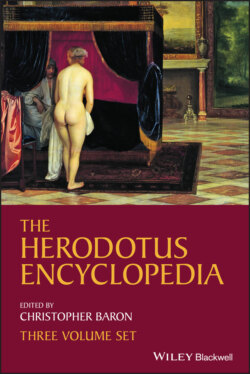Читать книгу The Herodotus Encyclopedia - Группа авторов - Страница 478
APHRODITE (Ἀϕροδίτη, ἡ)
ОглавлениеBRUCE LINCOLN
University of Chicago
Herodotus never employs the name “Aphrodite” for a Greek deity. Rather, he uses it, sometimes accompanied by the modifier Ouraniē, to denote various erotically‐charged eastern goddesses, including Arabian ALILAT (1.131.3; 3.8.2), Assyrian MYLITTA (1.131.3, 199.3), Scythian ARGIMPASA (4.59.2), Persian “MITRA” (1.131.3), and goddesses of EGYPT (2.41.5, 112.2), ASCALON (1.105.1), and CYRENE (2.181.4), whose indigenous names go unmentioned. Responsibility for (and interest in) sexuality can be a prime feature of these goddesses (MacLachlan 1992), as when a Cyrenean woman asks Aphrodite to help consummate her MARRIAGE (2.181.4); when the Assyrian Aphrodite requires Babylonian women to prostitute themselves (1.199.1–5); or when Ascalon’s Aphrodite (= Atargatis) transforms SCYTHIANS who defiled her temple into androgynes (1.105.1–2; 4.67.2: see ENAREES). Although some scholars still follow Herodotus in grouping these deities together as “Near Eastern fertility goddesses,” this oversimplifies a more complex situation, emphasizing a few shared features of a general sort, while ignoring those distinctive to each goddess, e.g., Alilat’s role as guarantor of OATHS (3.8.1–2), Argimpasa’s control of DIVINATION (4.67.2), or an Egyptian Aphrodite’s concern to exhume and rebury the bones of sacred CATTLE (2.41.4–6). In Greek religion, Aphrodite's role similarly expands well beyond the erotic, as evidenced by her role in certain cosmogonies and the maternal care she shows for her son, Aeneas.
SEE ALSO: Gods and the Divine; Religion, Herodotus’ Views on; Sex
